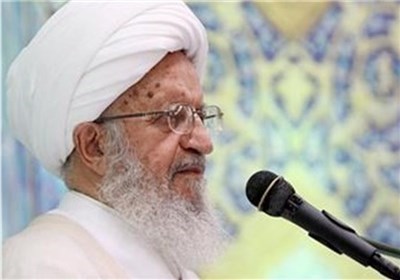A lack of knowledge about the laws of jurisprudence, the principles of jurisprudence, and convictions is a problem that has plagued the extremist Salafis today.
Extending his congratulations on the occasion of the Great Prophet Muhammad (S) and Imam Ja’far as-Sadiq’s (A) birthday and the Week of Unity, which were recently celebrated, in the beginning of his jurisprudence course, Grand Ayatollah Naser Makarem-Shirazi stated: “Today we, the Muslim people, are in need of unity more than ever, for, the enemies have united against us and seek to create schisms among the Muslim people.”
While defining the concept of unity he continued: “Unity means to focus on the common grounds and refrain from insulting the sanctities of other sects, and this is something that we should all adhere to.”
His Eminence, then, stated: “today we should concentrate on Islam, the Quran, the Great Prophet (S) and the Ka’bah, that form the core of our commonalities and we should also avoid insulting other people’s sanctities, for by insulting other sects we would, in fact, be adding fuel to the flames of discord that would ultimately lead to a civil war.”
Referring to the actions taken by the Salafis and the extremist Wahhabis, His Eminence said: “the week of unity is a week of festivity and celebration for the birthday of the Great Prophet (S) and the birthday of Imam as-Sadiq (A) in which we have to forget our disagreements and emphasize our common grounds.”
Referring to the fatwa issued by the Grand Mufti of Saudi Arabia who has declared the celebrations held for the birthday of the Prophet (S) as prohibited, Ayatollah Makarem-Shirazi stated: “such individuals consider these celebrations as innovations in the religion while innovation has a clear definition to which they pay no attention. Innovation in the religion is, in effect, something that has not been a part of the religion but someone adds it to the religion as a part of it; for instance if one says that celebrating the Prophet’s birthday is a part of the Quran or the Prophet’s tradition, it is considered to be prohibited; however, if it is practiced based on the common law and as a logical and rational way of paying tribute to the Great Prophet (S) it is not considered to be an innovation in the religion at all. People all around the world hold birthday parties for themselves and for their children, and no one ever says that such birthday parties are a part of the religion or it is a teaching derived from the Quran or the tradition.”
Ayatollah Makarem-Shirazi also added: “If we were to think like this, we would have to consider anything new in the religious settings, including the things that are based on the common law, as innovation in religion, thus we would have to consider the building of the Masjid al-Haram (The Sacred Mosque) and Masjid al-Nabawi (The Prophet’s Mosque) and their minaret as innovations as they did not exist in this way in the time of the Prophet (S); similarly if we were to think like this we would have to consider the ceremonies for the memorization and different types of recitations of the Quran, including the melodic recitation of the Quran, as innovations in the religion as none of them existed like this in the time of the Prophet and must all be declared as prohibited.”
He further stated: “The root of discord and division are these very extremist thoughts which have to be uprooted and destroyed.”
Referring to the actions taken by the Egyptian Salafis in order to prevent the holding of celebrations for the birthday of the Prophet (S), His Eminence noted: “assuming that you believe such ceremonies are innovations, you should avoid taking part in such celebrations but you do not have the right to impose your idea on others, even on the Great scholars of al-Azhar. Who has given you the right to impose your ideas on others? This is an even Greater innovation in the religion.”
Ayatollah Makarem-Shirazi then noted: “A lack of knowledge about the laws of jurisprudence, the principles of jurisprudence, and convictions is the problem that has plagued the extremist Salafis today.”
In the end, His Eminence addressed the extremist Salafis and Wahhabis, and stated: “who has assured you that you are more knowledgeable than others and that other people must follow your ideas? It is time you thought rationally and put away your prejudice and stop making such mistakes persistently, so as to be able to help the Muslim people achieve unity.”
/257

